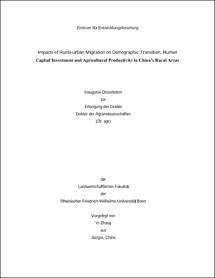Impacts of Rural-urban Migration on Demographic Transition, Human Capital Investment and Agricultural Productivity in China’s Rural Areas

Impacts of Rural-urban Migration on Demographic Transition, Human Capital Investment and Agricultural Productivity in China’s Rural Areas

| dc.contributor.advisor | von Braun, Joachim | |
| dc.contributor.author | Zhang, Yi | |
| dc.date.accessioned | 2020-04-20T07:55:18Z | |
| dc.date.available | 2020-04-20T07:55:18Z | |
| dc.date.issued | 21.07.2015 | |
| dc.identifier.uri | https://hdl.handle.net/20.500.11811/6254 | |
| dc.description.abstract | This dissertation focuses on the impacts of rural-urban migration on the rural areas in China. It consists of five chapters. The first chapter introduces the research problems and presents the framework for studying three selected impacts of migration. These impacts are on the demographic change of the rural population, human capital investment, and agricultural productivity, and are all respectively discussed in the middle three chapters. The last chapter is a case study of a typical Chinese village with massive rural-urban migration. The second chapter first estimates the scale and age-structure of the rural-urban migrants, and then separates the effects of migration on the rural demography by performing simulations with the Cohort Component Method and using data from China’s latest censuses in 2000 and 2010. In addition, it uses household data to confirm the huge effect of rural-urban migration on the demographic structure. The third chapter develops a theoretical framework to investigate the relationship between migration and education. Empirical research reveals a robustly positive effect of migration on educational attainment among the stayers by proposing a novel instrument of the availability of local train stations to deal with the endogeneity. The fourth chapter sets up a theoretical model to study the impacts of migration on agricultural productivity and empirically employs a Simultaneous Equations Model estimated by two-step-least-square method. Empirical results show that migration of the labor force reduces agricultural productivity and households with migration do not invest more in agriculture unless the land size reaches an optimal level. Migration along with land transfer can improve agricultural productivity. The fifth chapter presents a case study of a Chinese village which is transforming its labor-intensive agriculture into a capital-intensive one based on changes in relative scarcity of production factors triggered by the rural-urban migration. It indicates that migration as an external force has broken equilibrium of the traditional agriculture and leads modern agriculture to take off by inducing capital to substitute for labor in agriculture. | en |
| dc.description.abstract | Die vorliegende Arbeit beschäftigt sich mit den Auswirkungen von Land-Stadt-Migration auf ländliche Gebiete in China. Die Arbeit besteht aus fünf Kapiteln. Das erste Kapitel beschreibt den Forschungsgegenstand und das Bezugssystem für die Analyse von drei ausgewählten Auswirkungen von Migration. Diese drei ausgewählten Auswirkungen sind der demographische Wandel auf dem Land, die Investitionen in Humankapital und landwirtschaftliche Produktivität. Diese drei Aspekte werden jeweils in den drei mittleren Kapiteln behandelt. Das letzte Kapitel ist eine Fallstudie eines typischen chinesischen Dorfes mit massiver Land-Stadt-Migration. Das zweite Kapitel schätzt zunächst die Ausmaße der Land-Stadt-Migration und die Altersstruktur der Migranten und separiert dann die Effekte der Migration auf die ländliche Demographie mithilfe von Simulationen mit der Kohorten-Komponenten-Methode und Daten der letzten chinesischen Volkszählungen in 2000 und 2010. Zusätzlich werden Haushaltsdaten genutzt, um die enormen Effekte der Land-Stadt-Migration auf die demographische Struktur zu erfassen. Im dritten Kapitel wird ein theoretischer Rahmen entwickelt, in dem die Beziehung zwischen Migration und Ausbildung untersucht werden. Empirische Forschung mithilfe einer IV Schätzung mit fixen Effekten, die das Vorhandensein von lokalen Bahnhöfen als neues Instrument nutzt, zeigt einen robusten positiven Effekt von Migration auf den Ausbildungsstand derer, die auf dem Land bleiben. Im vierten Kapitel wird zunächst ein theoretisches Modell zur Untersuchung der Auswirkungen von Migration auf die landwirtschaftliche Produktivität aufgestellt. Empirisch wird mithilfe der 2SLS-Methode ein Modelsimultan geschätzt. Die empirischen Ergebnisse zeigen, dass Arbeitskräftemigration die landwirtschaftliche Produktivität reduziert und Haushalte mit Migration nicht mehr in die Landwirtschaft investieren bis ihr Landbesitz eine optimale Größe erreicht. Migration kombiniert mit Landtransfers kann jedoch die Produktivität verbessern. Das fünfte Kapitel präsentiert eine Fallstudie eines chinesischen Dorfes, das aufgrund relativer Knappheit von Produktionsfaktoren, die durch Land-Stadt-Migration ausgelöst wurde, seine arbeitsintensive Landwirtschaft in eine kapitalintensive umwandelt. Die Fallstudie zeigt, dass Migration als externer Einflussfaktor das Gleichgewicht von traditioneller Landwirtschaft gebrochen hat und nun dazu führt, dass durch die Substitution von Arbeit durch Kapital die moderne Landwirtschaft Einzug hält. | en |
| dc.language.iso | eng | |
| dc.rights | In Copyright | |
| dc.rights.uri | http://rightsstatements.org/vocab/InC/1.0/ | |
| dc.subject.ddc | 630 Landwirtschaft, Veterinärmedizin | |
| dc.title | Impacts of Rural-urban Migration on Demographic Transition, Human Capital Investment and Agricultural Productivity in China’s Rural Areas | |
| dc.type | Dissertation oder Habilitation | |
| dc.publisher.name | Universitäts- und Landesbibliothek Bonn | |
| dc.publisher.location | Bonn | |
| dc.rights.accessRights | openAccess | |
| dc.identifier.urn | https://nbn-resolving.org/urn:nbn:de:hbz:5n-40730 | |
| ulbbn.pubtype | Erstveröffentlichung | |
| ulbbnediss.affiliation.name | Rheinische Friedrich-Wilhelms-Universität Bonn | |
| ulbbnediss.affiliation.location | Bonn | |
| ulbbnediss.thesis.level | Dissertation | |
| ulbbnediss.dissID | 4073 | |
| ulbbnediss.date.accepted | 10.07.2015 | |
| ulbbnediss.institute | Zentrale wissenschaftliche Einrichtungen : Zentrum für Entwicklungsforschung (ZEF) | |
| ulbbnediss.fakultaet | Landwirtschaftliche Fakultät | |
| dc.contributor.coReferee | Heckelei, Thomas |
Files in this item
This item appears in the following Collection(s)
-
E-Dissertationen (1127)




